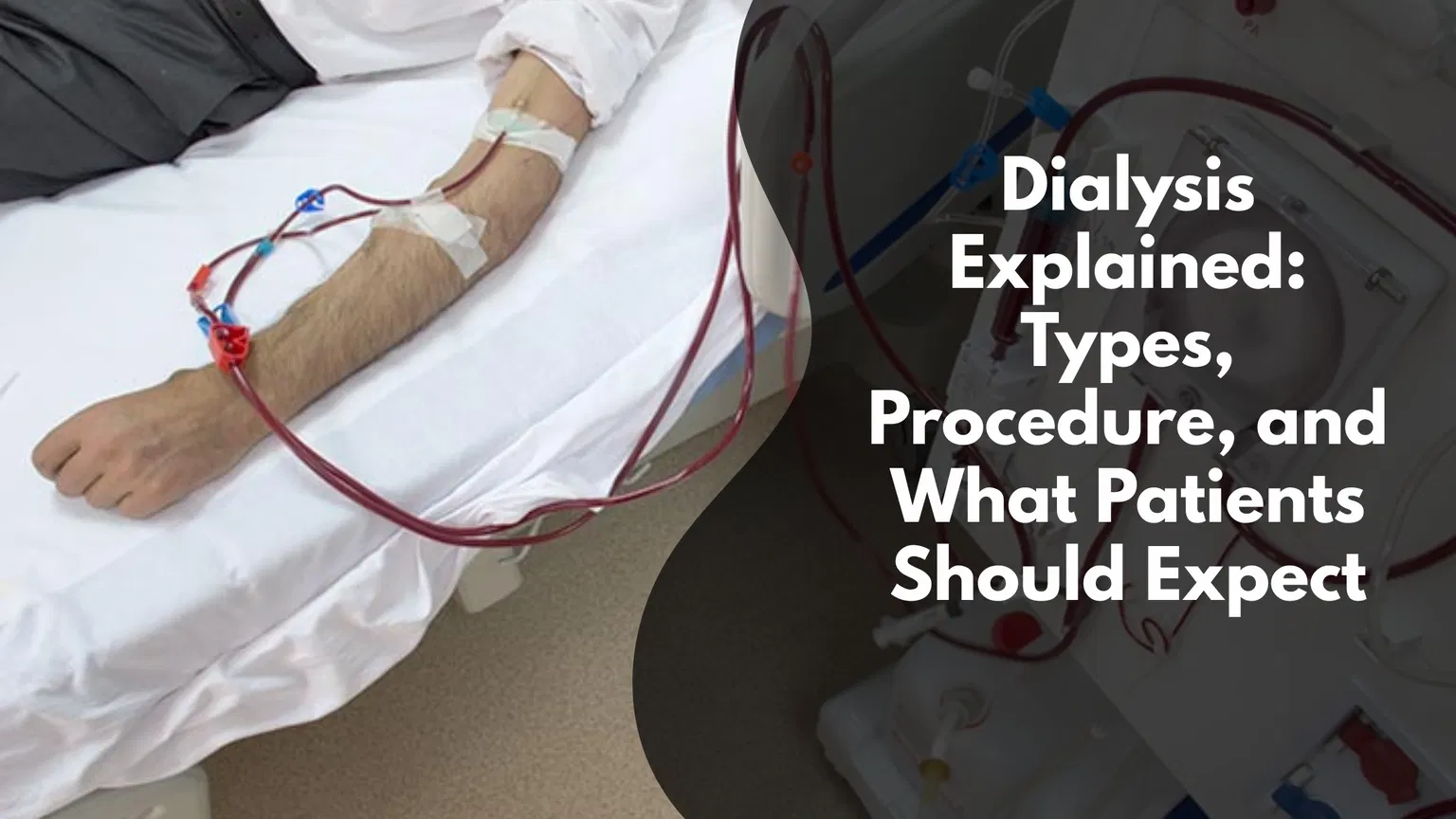Dialysis Explained: Types, Procedure, and What Patients Should Expect

Kidneys play a vital role in filtering waste, balancing electrolytes, and regulating blood pressure. When kidney function declines significantly, waste and fluids build up in the body, leading to serious health complications. This is where dialysis becomes a lifesaving procedure.
Dialysis is a medical treatment that performs the filtering functions of the kidneys when they can no longer work effectively. It’s essential for patients with chronic kidney disease (CKD) or end-stage kidney failure. Consulting a kidney specialist in South Delhi early can help manage kidney disease and prepare patients for dialysis when necessary.
In this blog, we’ll discuss what dialysis is, the different types available, the procedure, what patients should expect, and the importance of consulting a nephrologist doctor in South Delhi for personalized kidney care.
What is Dialysis?
Dialysis is a treatment that removes excess waste, toxins, and fluids from the blood. In healthy kidneys, this filtering process happens naturally. However, when kidneys are damaged due to conditions like diabetes, hypertension, or chronic kidney disease, dialysis helps maintain the body’s chemical balance.
Dialysis is not a cure but a life-supporting treatment that helps patients live longer and maintain a better quality of life. There are two primary types of dialysis: hemodialysis and peritoneal dialysis, each with unique methods and benefits.
Types of Dialysis
Hemodialysis
How it works:
Hemodialysis uses a machine called a dialyzer to clean blood. Blood is pumped out of the body, filtered through the machine to remove toxins and excess fluids, and then returned to the body.
Frequency:
Typically, patients undergo hemodialysis three times a week, with each session lasting 3–5 hours.
Advantages:
-
Rapid removal of waste and fluids
-
Performed under medical supervision in a hospital or dialysis center
-
Suitable for patients with advanced kidney failure
Considerations:
-
Requires access to blood vessels through a fistula, graft, or catheter
-
Can cause fatigue or low blood pressure during sessions
Peritoneal Dialysis
How it works:
Peritoneal dialysis uses the lining of the abdomen (peritoneum) as a natural filter. A special fluid is introduced into the abdominal cavity, where it absorbs waste and excess fluid, then drained out.
Types of Peritoneal Dialysis:
-
Continuous Ambulatory Peritoneal Dialysis (CAPD) – done manually several times a day
-
Automated Peritoneal Dialysis (APD) – done at night using a machine
Advantages:
-
Can be done at home, offering flexibility
-
Gentle on the body compared to hemodialysis
-
Suitable for patients who prefer home-based treatment
Considerations:
-
Requires strict hygiene to prevent infection
-
Patients must be trained on proper procedures
The Dialysis Procedure
Hemodialysis Procedure:
-
Access creation: A fistula, graft, or catheter is inserted into the patient’s arm or neck.
-
Blood circulation: Blood is drawn into the dialyzer.
-
Filtration: The dialyzer removes waste and excess fluids.
-
Return: Cleaned blood is returned to the body.
-
Monitoring: Vital signs are continuously checked during the procedure.
Peritoneal Dialysis Procedure:
-
Catheter placement: A small tube is surgically placed into the abdomen.
-
Fluid exchange: Dialysis solution is introduced and left for several hours.
-
Drainage: The solution, now containing waste, is drained and replaced.
-
Repetition: CAPD requires multiple exchanges; APD is automated overnight.
Both procedures are safe when performed under expert supervision by a kidney specialist in South Delhi or best nephrology doctor in South Delhi.
What Patients Should Expect
During the initial dialysis sessions, patients may experience mild fatigue, low blood pressure, or muscle cramps. These effects are usually temporary and manageable with medical guidance.
Tips for patients:
-
Follow a kidney-friendly diet recommended by your nephrologist
-
Stay hydrated according to your doctor’s advice
-
Monitor weight and blood pressure regularly
-
Keep a record of any unusual symptoms
Patients often adapt to dialysis routines over time, maintaining a good quality of life with consistent treatment.
When to Consult a Kidney Specialist
Consulting a nephrologist doctor in South Delhi is essential if you experience:
-
Swelling in feet, hands, or face
-
Persistent fatigue or weakness
-
Changes in urine (frequency, color, or foamy urine)
-
High blood pressure or uncontrolled diabetes
Early consultation allows the best kidney doctor in South Delhi to recommend preventive strategies, monitor kidney function, and prepare for dialysis if necessary.
Dialysis and Quality of Life
While dialysis is a critical life-supporting treatment, lifestyle and dietary management play an essential role in improving outcomes:
-
Maintain a balanced, low-salt diet
-
Avoid excessive fluids if advised by your doctor
-
Limit intake of processed foods
-
Stay physically active within your capability
-
Seek mental health support for stress or anxiety
With proper guidance from a kidney specialist in South Delhi, dialysis patients can continue working, exercising, and leading fulfilling lives.
Advanced Kidney Care: Renal Transplant
For patients with end-stage kidney failure, a renal transplant in South Delhi may offer the best chance for long-term health and freedom from dialysis. A transplant involves replacing a damaged kidney with a healthy donor kidney.
Dr. Tanmaya Pandya, a leading nephrologist doctor in South Delhi, provides expert pre-transplant evaluations, performs advanced transplant procedures, and manages post-transplant care. This comprehensive approach ensures patients achieve the best possible outcomes and maintain kidney health.
FAQs
1. What is the difference between hemodialysis and peritoneal dialysis?
Hemodialysis filters blood using a machine at a hospital, while peritoneal dialysis uses the abdominal lining and can often be done at home.
2. How often do dialysis patients need treatment?
Hemodialysis is usually 3 times per week, while peritoneal dialysis is done daily or overnight.
3. Can dialysis completely replace kidney function?
No, dialysis performs the filtering function but does not replace all kidney functions like hormone production.
4. Are lifestyle changes needed during dialysis?
Yes, patients must manage diet, fluid intake, and medications carefully under a nephrologist’s guidance.
5. How long can a patient live on dialysis?
With proper care and regular treatment, many patients live several years while maintaining a good quality of life, and some may eventually be eligible for a transplant.
Conclusion
Dialysis is a vital treatment for patients with kidney failure, helping remove waste, regulate fluids, and maintain health. Understanding the types of dialysis, the procedure, and what to expect can ease anxiety and prepare patients for this life-saving treatment.
Consulting a kidney specialist in South Delhi like Dr. Tanmaya Pandya ensures personalized care, early intervention, and continuous support, whether you require dialysis or advanced treatments like renal transplant in South Delhi. Take proactive steps today to protect your kidneys and ensure a healthier future.





- Live Stream
- Causes
- Crafts
- Dance
- Drinks
- Film
- Fitness
- Food
- Oyunlar
- Gardening
- Health
- Home
- Literature
- Music
- Networking
- Other
- Party
- Religion
- Shopping
- Sports
- Theater
- Wellness
- Art
- Life
- Coding




